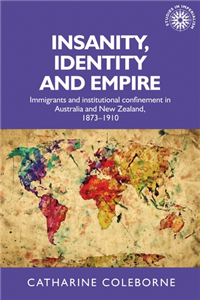Insanity, identity and empire
Immigrants and institutional confinement in Australia and New Zealand, 1873–1910
by Catharine Coleborne
Description
More Information
Rights Information
Albania, Algeria, Angola, Argentina, Armenia, Australia, Austria, Bahrain, Belgium, Belize, Benin, Bolivia, Bosnia and Herzegovina, Botswana, Brazil, Bulgaria, Burkina Faso, Burundi, Cameroon, Canada, Cape Verde, Central African Republic, Chad, Chile, China, Colombia, Comoros, Congo [DRC], Congo, Republic of the, Costa Rica, Ivory Coast, Croatia, Czech Republic, Denmark, Djibouti, Ecuador, Egypt, El Salvador, Equatorial Guinea, Eritrea, Estonia, Ethiopia, Faroe Islands, Finland, France, French Guiana, Gabon, Gambia, Georgia, Germany, Ghana, Greece, Guatemala, Guinea, Guinea-Bissau, Guyana, Honduras, Hongkong, Hungary, Iceland, India, Indonesia, Iran, Iraq, Ireland, Israel, Italy, Japan, Jordan, Kazakhstan, Kenya, Kuwait, Latvia, Lebanon, Lesotho, Liberia, Libya, Lithuania, Luxembourg, Macau, China, Macedonia [FYROM], Madagascar, Malawi, Malaysia, Mali, Malta, Mauritania, Mauritius, Mayotte, Mexico, Mongolia, Montenegro, Morocco, Mozambique, Namibia, Netherlands, New Zealand, Nicaragua, Niger, Nigeria, Norway, Oman, Pakistan, Panama, Paraguay, Peru, Philippines, Poland, Portugal, Puerto Rico, Qatar, Reunion, Romania, Russia, Rwanda, Saint Helena, Sao Tome and Principe, Saudi Arabia, Senegal, Serbia, Seychelles, Sierra Leone, Singapore, Slovakia, Slovenia, Somalia, South Africa, South Korea, Spain, Sri Lanka, Sudan, Suriname, Swaziland, Sweden, Switzerland, Syria, Taiwan, Tanzania, Thailand, Timor-Leste, Togo, Tokelau, Tunisia, Turkey, Uganda, Ukraine, United Arab Emirates, United Kingdom, United States, Uruguay, Venezuela, Vietnam, Western Sahara, Yemen, Zambia, Zimbabwe, South Sudan, Cyprus, Palestine, Bangladesh, Cambodia, Liechtenstein, Azerbaijan
Endorsements
This book examines the formation of colonial social identities inside the institutions for the insane in Australia and New Zealand. It looks at insanity in the context of migration to the colonies by focusing on two urban, public hospitals for the insane in Victoria, Australia, and Auckland, New Zealand, between 1873 and 1910. During this period, there was a significant amount of migration from Britain and other parts of the world to both destinations, as part of a widespread Anglo-settler 'explosion'. This was also the period in which social institutional networks were developed across the colonies. These social institutions included health, medical and welfare institutions, all of which were modelled on British imperial institutional spaces and with imperial sensibilities. Of particular interest to students and historians of colonialism, imperialism and medicine at undergraduate and postgraduate level, the book examines the creation of an institutional language of gender and race in two nineteenth-century colonial institutional sites. It will also appeal to the many historians of insanity and its institutions, given that these sites were part of an imperial network of solutions to the problem of 'madness' which followed Europeans to new places of settlement.
Reviews
This book examines the formation of colonial social identities inside the institutions for the insane in Australia and New Zealand. It looks at insanity in the context of migration to the colonies by focusing on two urban, public hospitals for the insane in Victoria, Australia, and Auckland, New Zealand, between 1873 and 1910. During this period, there was a significant amount of migration from Britain and other parts of the world to both destinations, as part of a widespread Anglo-settler 'explosion'. This was also the period in which social institutional networks were developed across the colonies. These social institutions included health, medical and welfare institutions, all of which were modelled on British imperial institutional spaces and with imperial sensibilities. Of particular interest to students and historians of colonialism, imperialism and medicine at undergraduate and postgraduate level, the book examines the creation of an institutional language of gender and race in two nineteenth-century colonial institutional sites. It will also appeal to the many historians of insanity and its institutions, given that these sites were part of an imperial network of solutions to the problem of 'madness' which followed Europeans to new places of settlement.
Author Biography
Catharine Coleborne is Professor of History at the University of Waikato, New Zealand
Manchester University Press
Manchester University Press is a leading UK publisher known for excellent research in the humanities and social sciences.
View all titlesBibliographic Information
- Publisher Manchester University Press
- Publication Date June 2021
- Orginal LanguageEnglish
- ISBN/Identifier 9781526156310 / 1526156318
- Publication Country or regionUnited Kingdom
- FormatPrint PDF
- Pages240
- ReadershipGeneral/trade; College/higher education; Professional and scholarly
- Publish StatusPublished
- Dimensions234 X 156 mm
- Biblio NotesDerived from Proprietary 1569
- SeriesStudies in Imperialism
- Reference Code13931
Manchester University Press has chosen to review this offer before it proceeds.
You will receive an email update that will bring you back to complete the process.
You can also check the status in the My Offers area

Please wait while the payment is being prepared.
Do not close this window.



